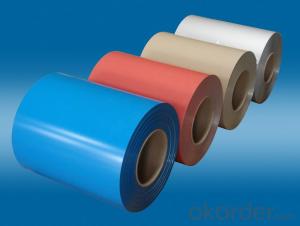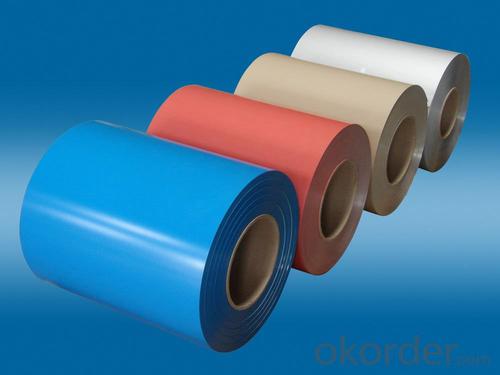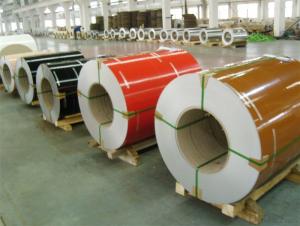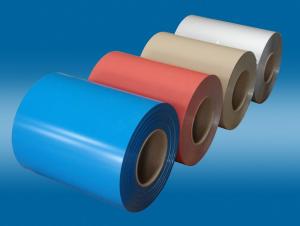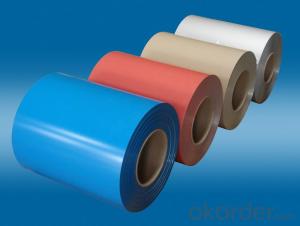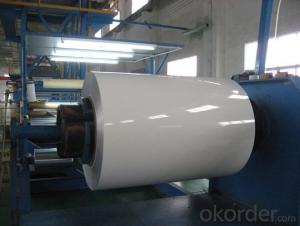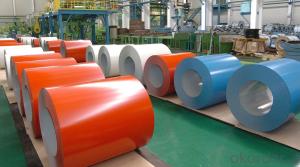Aluminum Coil Canada - AA1100 Prepainted Aluminum Coils for Construction
- Loading Port:
- Shanghai
- Payment Terms:
- TT OR LC
- Min Order Qty:
- 5 m.t.
- Supply Capability:
- 10000 m.t./month
OKorder Service Pledge
OKorder Financial Service
You Might Also Like
Specification
1.Structure of AA1100 Prepainted Aluminium Coils Used for Construction Description
AA1100 Prepainted Aluminium Coils Used for Construction are of a wide range of colors, which give wonderful appearance no matter in residential and commercial constructions or great exhibition centers.
AA1100 Prepainted Aluminium Coils Used for Construction have been widely used in the fields of construction and decoration, electronic applications, lighting decoration, air-condition air pipes, sandwich panels and drainages etc.
2.Main Features of AA1100 Prepainted Aluminium Coils Used for Construction
• Superior quality of raw material
• Reasonable and stable chemical composition
• Accurate tolerance
• Goode mechanical property
3.AA1100 Prepainted Aluminium Coils Used for Construction Images
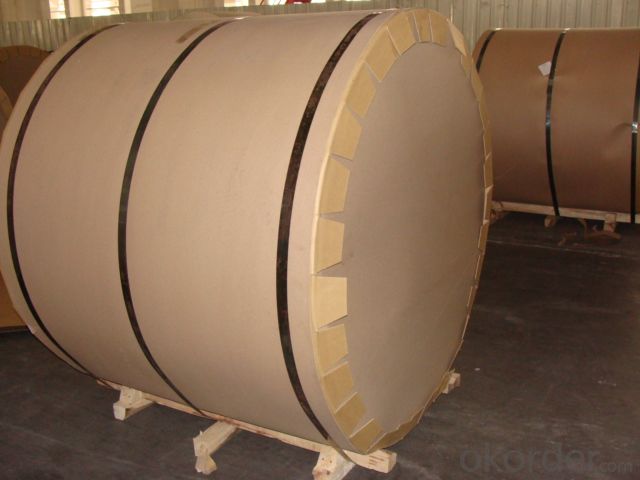
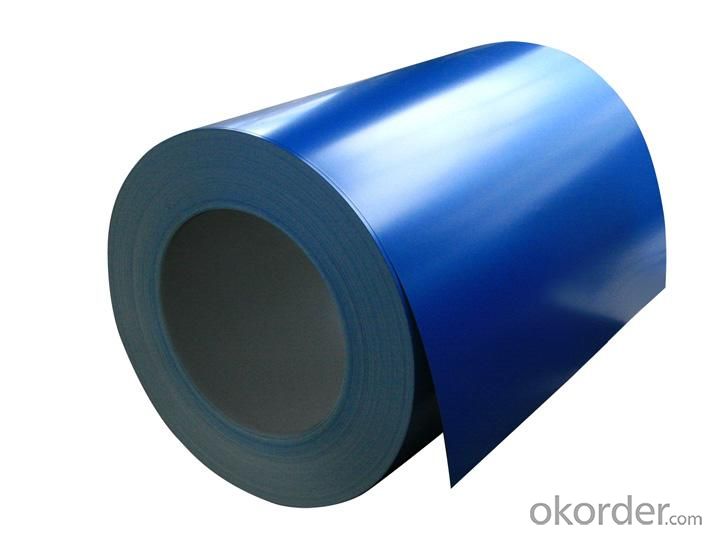
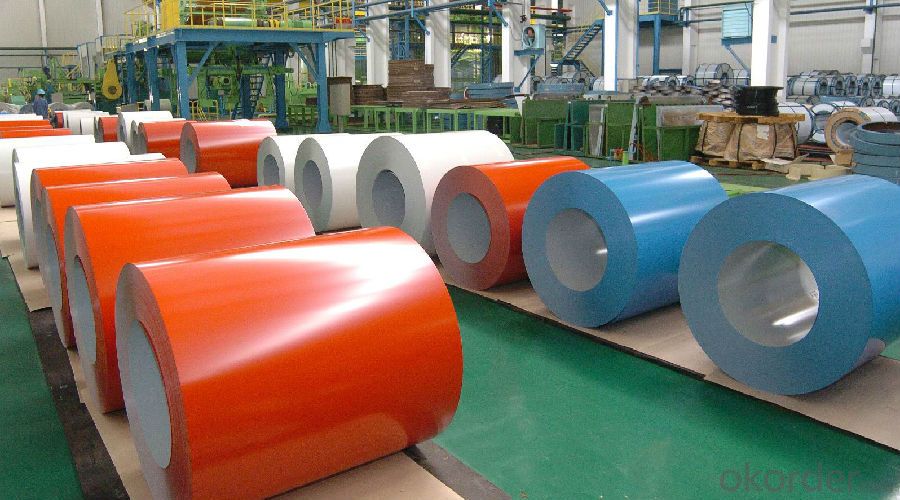
4.AA1100 Prepainted Aluminium Coils Used for Construction Specification
Alloy | AA1100 |
Temper | H14,H16,H18,H22,H24,H26,H32,O/F |
Thickness | 0.03mm-3.0mm |
Width | 30mm-1700mm |
Coating | PE,PVDF,Epoxy |
Painting Thickness | Standard 16-25 Mic, max 40 Mic |
Color | According to RAL colors or customers' samples |
Standard | GB/T 17748-1999 |
5.FAQ:
What is the quality standard?
---Usually our standard is GB3880-2006
What is the largest width?
---It is 2000mm
What is the MOQ?
---Usually we can accept 80 tons.
- Q: Can aluminum coils be used in automotive body panels?
- Automotive body panels can indeed utilize aluminum coils. Being both lightweight and corrosion-resistant, aluminum proves to be a suitable material for automotive purposes. The employment of aluminum coils in body panels yields numerous benefits, such as enhanced fuel efficiency owing to the reduced vehicle weight, improved handling and maneuverability, and increased durability. Moreover, aluminum boasts high recyclability, rendering it an environmentally conscious alternative for automotive production. Numerous automakers have already begun integrating aluminum coils into their vehicles, and this trend is anticipated to persist as the industry aims for lighter and more environmentally sustainable automobiles.
- Q: What are the width tolerances for aluminum coils?
- The width tolerances for aluminum coils can vary depending on the specific application and industry standards. However, in general, the standard width tolerances for aluminum coils typically range between +/- 0.005 inches to +/- 0.020 inches. These tolerances ensure that the width of the aluminum coil falls within an acceptable range and meets the required dimensions for the intended use. It is worth noting that tighter tolerances may be achievable depending on the specific manufacturing processes and equipment capabilities. Therefore, it is essential to consult the appropriate industry standards and specifications to determine the exact width tolerances required for a particular application.
- Q: My front door is scraping the aluminum frame door jam thing on the bottom. Also underneith the door itself it seems like there is a huge aluminum device covering the whole bottom of it and an aluminum weather stipper built into that. Is my only option to have the door pulled off. Or could I maybe grind of file down the aluminum on the bottom?
- Check your hinges first. typically your upper hinge has become loose or bent. If it is bent you could use wood 2X4 as lever under bottom corner and pry it back into position.
- Q: who invented aluminum and or aluminum foil?
- Scientists suspected that an unknown metal existed in alum as early as 1787, but they did not have a way to extract it until 1825. Hans Christian Oersted, a Danish chemist, was the first to produce tiny amounts of aluminum. During that time, the method to extract aluminum was so costly that aluminum once was considered more precious than gold. The plant, owned by J.G. Neher Sons (aluminum manufacturers) started in 1886 in Schaffhausen, Switzerland, at the foot of the Rhine Falls - capturing the falls’ energy to produce aluminum. Neher's sons together with Dr. Lauber discovered the endless rolling process and the use of aluminum foil as a protective barrier. From there began the wide use of aluminum foil in the packaging of chocolate bars and tobacco products. Processes evolved over time to include the use of print, color, lacquer, laminate and the embossing of the aluminum. Although the technology to extract aluminum improved greatly, it still is a energy extensive process. If you, as a chemist can figure out a way to reduce the amount of energy needed to extract aluminum even by 1%, your method can make you a millionaire overnight. There is a thought to motivate you to study Chem. =)
- Q: Can aluminum coils be used in telecommunications infrastructure?
- Yes, aluminum coils can be used in telecommunications infrastructure. Aluminum is commonly used in various components of telecommunications infrastructure, including cables, connectors, and antennas. It is preferred for its lightweight, durable, and corrosion-resistant properties, making it suitable for outdoor installations. Additionally, aluminum coils provide excellent conductivity, ensuring efficient transmission of signals in telecommunications systems.
- Q: How are aluminum coils made?
- Aluminum coils are made through a process called continuous casting and rolling. First, pure aluminum is heated and melted in a furnace. Then, the molten aluminum is poured through a curved mold with a small opening at the bottom, where it solidifies into a long, thin strip. This strip is then passed through a series of rolling mills, where it is gradually reduced in thickness and lengthened to form a coil. The coils are then cooled, inspected, and ready to be used in various industries such as construction, automotive, and packaging.
- Q: Are aluminum coils suitable for electrical insulation?
- No, aluminum coils are not suitable for electrical insulation. Aluminum is a good conductor of electricity, meaning it allows the flow of electric current rather than resisting it. In electrical systems, insulation is needed to prevent the flow of electricity and protect against short circuits or electrical shock. Materials such as rubber, plastic, or ceramic are commonly used for electrical insulation due to their high resistance to electric current.
- Q: Are aluminum coils suitable for interior decorative applications?
- Yes, aluminum coils are suitable for interior decorative applications. Aluminum is a lightweight and versatile material that can be easily shaped into various forms, making it ideal for decorative purposes. It also comes in a wide range of finishes, colors, and patterns, allowing for endless design possibilities. Additionally, aluminum is highly durable and resistant to corrosion, ensuring that it will maintain its aesthetic appeal over time. Moreover, aluminum is a sustainable material, as it can be recycled indefinitely, making it an environmentally friendly choice for interior decorations. Overall, aluminum coils provide a cost-effective and aesthetically pleasing option for interior decorative applications.
- Q: Are aluminum coils resistant to chemicals?
- Generally, chemicals do not pose a problem for aluminum coils due to their inherent resistance. This is because aluminum naturally develops a protective oxide layer on its surface, which shields it from various chemicals. Consequently, the oxide layer effectively prevents corrosion and deterioration of the aluminum coils when they come into contact with different substances. Nevertheless, it is worth mentioning that certain chemicals, particularly potent acids or alkalis, can still harm aluminum. In such instances, applying additional protective coatings or treatments becomes essential to strengthen the chemical resistance of the aluminum coils.
- Q: Are aluminum coils suitable for electrical grounding applications?
- Yes, aluminum coils are suitable for electrical grounding applications. Aluminum has good electrical conductivity and corrosion resistance, making it an effective choice for grounding systems. Additionally, aluminum coils offer cost advantages over copper coils, making them a popular option in electrical grounding applications.
Send your message to us
Aluminum Coil Canada - AA1100 Prepainted Aluminum Coils for Construction
- Loading Port:
- Shanghai
- Payment Terms:
- TT OR LC
- Min Order Qty:
- 5 m.t.
- Supply Capability:
- 10000 m.t./month
OKorder Service Pledge
OKorder Financial Service
Similar products
Hot products
Hot Searches
Related keywords
